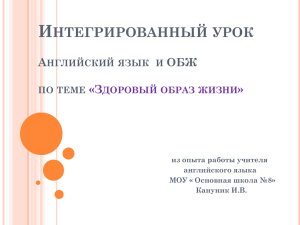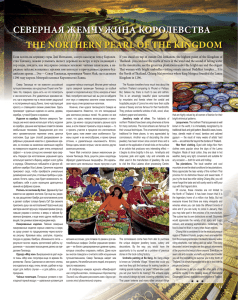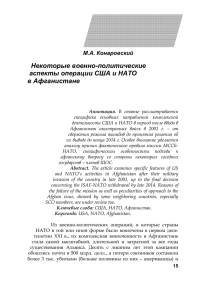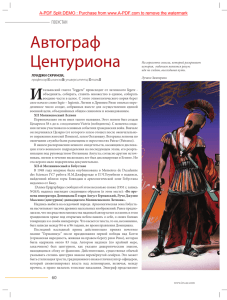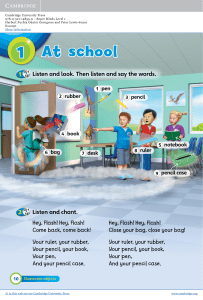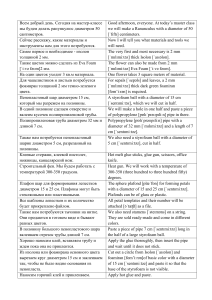THE USE OF PRIMARY SOURCE MATERIAL IN ACADEMIC RESEARCH: A VIEW
реклама
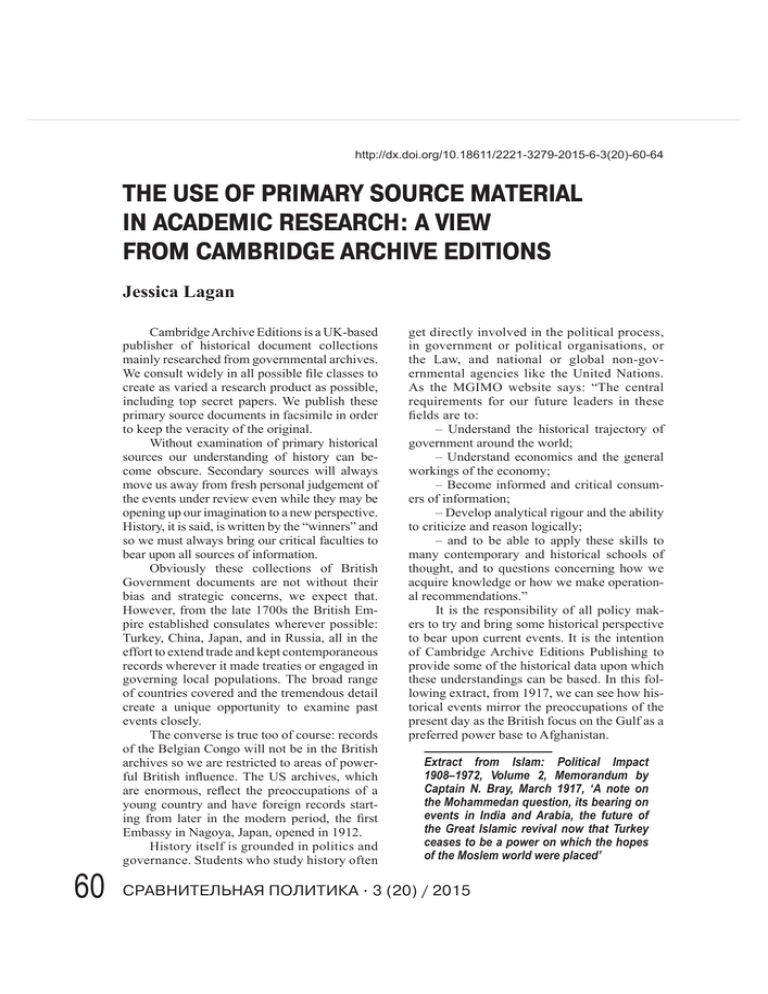
http://dx.doi.org/10.18611/2221-3279-2015-6-3(20)-60-64 THE USE OF PRIMARY SOURCE MATERIAL IN ACADEMIC RESEARCH: A VIEW FROM CAMBRIDGE ARCHIVE EDITIONS Jessica Lagan 60 Cambridge Archive Editions is a UK-based publisher of historical document collections mainly researched from governmental archives. We consult widely in all possible file classes to create as varied a research product as possible, including top secret papers. We publish these primary source documents in facsimile in order to keep the veracity of the original. Without examination of primary historical sources our understanding of history can become obscure. Secondary sources will always move us away from fresh personal judgement of the events under review even while they may be opening up our imagination to a new perspective. History, it is said, is written by the “winners” and so we must always bring our critical faculties to bear upon all sources of information. Obviously these collections of British Government documents are not without their bias and strategic concerns, we expect that. However, from the late 1700s the British Empire established consulates wherever possible: Turkey, China, Japan, and in Russia, all in the effort to extend trade and kept contemporaneous records wherever it made treaties or engaged in governing local populations. The broad range of countries covered and the tremendous detail create a unique opportunity to examine past events closely. The converse is true too of course: records of the Belgian Congo will not be in the British archives so we are restricted to areas of powerful British influence. The US archives, which are enormous, reflect the preoccupations of a young country and have foreign records starting from later in the modern period, the first Embassy in Nagoya, Japan, opened in 1912. History itself is grounded in politics and governance. Students who study history often get directly involved in the political process, in government or political organisations, or the Law, and national or global non-governmental agencies like the United Nations. As the MGIMO website says: “The central requirements for our future leaders in these fields are to: – Understand the historical trajectory of government around the world; – Understand economics and the general workings of the economy; – Become informed and critical consumers of information; – Develop analytical rigour and the ability to criticize and reason logically; – and to be able to apply these skills to many contemporary and historical schools of thought, and to questions concerning how we acquire knowledge or how we make operational recommendations.” It is the responsibility of all policy makers to try and bring some historical perspective to bear upon current events. It is the intention of Cambridge Archive Editions Publishing to provide some of the historical data upon which these understandings can be based. In this following extract, from 1917, we can see how historical events mirror the preoccupations of the present day as the British focus on the Gulf as a preferred power base to Afghanistan. Extract from Islam: Political Impact 1908–1972, Volume 2, Memorandum by Captain N. Bray, March 1917, ‘A note on the Mohammedan question, its bearing on events in India and Arabia, the future of the Great Islamic revival now that Turkey ceases to be a power on which the hopes of the Moslem world were placed’ СРАВНИТЕЛЬНАЯ ПОЛИТИКА . 3 (20) / 2015 МАТЕРИАЛЫ ДЛЯ ДИСКУССИИ “At the present moment agitation is intense in all Mohammedan countries…the reports of agents and others confirm…the extreme vitality of the [Pan-Islamic] movement . … It is ... essential that the country to whom Mohammedans look should not be Afghanistan. We should therefore create a State more convenient for ourselves, to whom the attention of Islam should be turned. We have an opportunity in Arabia. Strategically: Afghanistan is well placed for offensive action against India. Strategically: Arabia is well placed, from our point of view, for defence. Tactically: Afghanistan is difficult to attack. Tactically: Arabia is open to our attack from every quarter save the north. Politically: Afghanistan is difficult to control. Politically: Arabia can be controlled and influenced fully, if we only see that no other Power shapes her policy. This we have every right to insist upon. Geographically: Afghanistan is well placed to rally round her elements hostile to ourselves. Geographically: Arabia is ideally placed to divide those elements, the more so if we are installed in Baghdad.” Меморандум капитана Н. Брея, март 1917, «Заметки о мусульманском вопросе, его влиянии на события в Индии и Аравии, будущем Великом исламском возрождении теперь, когда Турция перестала быть державой, на которую возлагаются надежды мусульманского мира» «В настоящее время возбуждение велико во всех мусульманских странах… донесения агентов и других лиц подтверждают <…> исключительную жизнеспособность [панисламистского] движения. <…> Очень важно, чтобы страной, на которую ориентируются мусульмане, не стал Афганистан. Поэтому нам следует создать государство более удобное для нас самих, на которое можно было бы переключить внимание ислама. У нас есть такая возможность в Аравии. Стратегически: Афганистан хорошо расположен для наступательных действий против Индии. Стратегически: Аравия хорошо расположена, с нашей точки зрения, для обороны. Тактически: Афганистан трудно атаковать. Тактически: Аравия открыта для нашего наступления со всех сторон, кроме севера. Политически: Афганистан трудно контролировать. Политически: Аравия полностью поддается контролю и влиянию, если только мы позаботимся о том, чтобы ни одна другая держава не формировала ее политику. У нас есть все права, чтобы на этом настаивать. Географически: Афганистан хорошо расположен, чтобы объединить вокруг себя элементы враждебные нам. Географически: Аравия идеально расположена, чтобы расколоть эти элементы, в особенности, если мы обеспечим себе позиции в Багдаде»1. Despite the now politically redundant preoccupation with India, this document has tremendous modern political significance. Such a clear-sighted assessment of the difficult nature of Afghanistan is at odds with the recent American and British joint military operations there. In 1917 Britain clearly remembered her failed wars with Afghanistan from the 19th century. The observation here in 1917, with the fall of the Ottoman Empire in 1918, that “Turkey ceases to be a power on which the hopes of the Moslem world were placed” is of interest again with the current struggle between the religious and secular interests in Egypt today. The “agitation” in Mohammedan countries is once more present from the Northwest Frontier to Syria, and indeed in North Africa. Finding such documents of significance is the key to providing successful research collections. We take a structured approach to collection building, identifying scattered and fragmented material, collecting it together, arranging and describing it with the idea to provide a complete sequence of material which was not previously known or unified. According to the kinds of material we find we may make a collection of series of political or administrative reports, identify material appropriate to geopolitical boundary studies, collect material for a background work on development or country history, or choose a topic which we retrospectively decide is important such as the treatment of ethnic minorities in 1 Translations kindly provided by Tatyana Eliztratova, Cambridge University Press. COMPARATIVE POLITICS . 3 (20) / 2015 61 МАТЕРИАЛЫ ДЛЯ ДИСКУССИИ the Balkan states, or the rise of Zionism, or the history of Arab dissident movements. We often include maps where boundary issues are being examined, or where the maps are crucial for example in Land Legislation In Mandate Palestine. One aspect of the current ArabIsraeli dispute is over where Israeli settlements are sited. Occasionally a set of maps can stand on its own such as Historic Maps of Bahrain. When choosing a theme for a collection we first consider whether the British archives will be a strong source for information, and secondly whether the theme has modern political relevance and will be useful to an academic or governmental community. When we first considered creating a series of political reports on Iran we looked for themes of international interest. The British archives were a strong resource as the British government was a direct participant. There was the occupation of Iran by Britain during WWII, with its huge oil resources and jointly owned refineries: the USA was trying to get some leverage there and Russia shares a border with Iran. In this following document we can see a wonderful example of the necessity for judging carefully one’s speed of diplomacy and not overplaying one’s hand. Extract from Iran Political Diaries 1881– 1965, Volume 14, Political Report for July to September 1953. “…July saw a radical alteration in US policy towards the Government of Dr. Musaddiq. Some time previously Dr. Musaddiq had asked President Eisenhower for extensive American financial help. The President replied that the United States Government could not consider giving this help, so long as the Persian Government refused to settle the oil dispute on reasonable terms and thus to take advantage of their own abundant resources…While the U.S. Government were thus publicly cooling off towards Musaddiq, the Soviet government were warming up. Towards the end of June it became known that Mr Molotov had offered to negotiate with the Persian Government on frontier differences between the two countries…” 62 Выдержка из Иранских политических дневников (Iran Political Diaries 1881– 1965, Volume 14, Political Report for July to September 1953.) «В июле наметился радикальный сдвиг в политике США по отношению к правительству д-ра Моссадыка. За некоторое время до этого д-р Моссадык обратился к президенту Эйзенхауэру за обширной финансовой помощью. Президент ответил, что правительство США не может рассмотреть вопрос о предоставлении такой помощи до тех пор, пока иранское правительство отказывается от урегулирования спора о нефтяных концессиях на разумных условиях, и лишает себя, таким образом, возможности воспользоваться преимуществами своих собственных изобильных ресурсов. <…> В то время как правительство США публично охладело к д-ру Моссадыку, советское правительство начало проявлять к нему интерес. К концу июня стало известно, что г-н Молотов предложил иранскому правительству начать переговоры по урегулированию пограничного спора между двумя странами». Having based our publications in the history and development of the Middle East, due to the unique nature of the British involvement there, we have since branched out to provide research collections on the Far East and for the Caucasus and Russia, where Britain had consulates. In commissioning research into Korea it can be seen from the documents that the history and status of Korea was dependent upon the rivalries between, and the comparative strengths of, the three countries that lie adjacent to Korea - Russia, China and Japan. After the Second World War, the vacuum caused by the elimination of Japan from this equation meant that the Soviet Union, the USA and Communist China now vied for influence in Korea, and the post1945 division of the peninsula into North and South Korea and the outbreak of the Korean War in 1950 are symbols of that rivalry. The entrenchment of the division between the Communist North and the non-Communist South, and their respective supporters in the Soviet bloc and the capitalist West, is the central issue from the armistice in 1953 to the final report in this collection in 1970. This document below is one upon which the reader must bring critical judgement to bear, this reads like an eyewitness report and СРАВНИТЕЛЬНАЯ ПОЛИТИКА . 3 (20) / 2015 МАТЕРИАЛЫ ДЛЯ ДИСКУССИИ one has to wonder how the British could be so certain – did they have a spy in the court? Extract from Korea: Political & Economic Reports 1882–1970, Volume 4: Extract from despatch No. 86 dated 10 October 1895, from Seoul to Peking concerning the fate of the Queen of Korea: after the China–Japan war the Queen of Korea was opposed to the faction which favoured Japanese interests, and a plot was hatched to assassinate her: “…civilians …guarded by Japanese officers and soldiers, with a number of soldiers in Korean uniform… [took] possession of the King and the Crown Prince while others made for the Queen’s sleeping room…The Queen ran off down a corridor, but was pursued and knocked down, her assassin jumping on her breast several times while he repeatedly stabbed her with his sword…” Выдержка из Политических и экономических отчетов по Корее 1882–1970 том 4 Донесение № 86 от 10 октября 1895 г. Из Сеула в Пекин касательно судьбы королевы Кореи: после китайско-японской войны королева Кореи выступила против фракции, отстаивавшей японские интересы и был организован заговор с целю ее убийства. «Гражданские лица <…> охраняемые японскими офицерами и солдатами, с группой солдат одетых в корейскую военную форму <…> захватили короля и наследного принца, тогда как другие направились к спальне королевы. Королева бросилась бежать по коридору, но ее догнали и сбили с ног, ее убийца несколько раз подпрыгнул у нее на груди, в то время как он неоднократно всадил в нее свой меч…». ments also consist of reports and memoranda emanating in the Foreign Office in London, either in the Northern Department or in the Research Department (F.O.R.D.)., and during the confused period of the Civil War when there were no British diplomatic representatives in (Bolshevik) Russia, there were reports from the War Office in London, military officers and diplomats attached to the various missions with the anti-Bolshevik forces, as well as from British Army General Headquarters in Constantinople. It was the first time these documents have been published in their entirety, with the exception of two collections of reports about the confusing situation in Russia immediately after the Revolution and during the Civil War which were published as British Parliamentary Command Papers in 1919 and 1921. This extract which follows is a superb example of a historical document which captures a moment in history and at the same time provides the reader with a fine understanding of the contemporary significance conveyed by the tone of the writer. Extract from Soviet Union: Political Reports 1917–1970, Quarterly Report No. 54, 8 April 1953 “A quarter which began with the ‘doctor’s plot’, took in its stride Stalin’s death and his succession by Malenkov and ended with Chou-en-Lai’s acceptance of the voluntary repatriation of Korean War prisoners, has claims to be historic. The apparent departure from attitudes which, while Stalin was alive, seemed immutable, is astonishing enough. But even more remarkable is that the process of change should have been initiated before he was cold in his grave and by men whom we still have no reason to suppose were not, while he was alive, anything but his devoted associates.” Looking into the British archives to identify series of political reports from 1917 onwards we found reports and despatches sent from the British diplomatic representatives based in Petrograd and then Leningrad, and for a brief period during the Second World War from diplomats based in Kuibyshev where most of the Russian government and all the foreign embassies were evacuated as a result of the Nazi advance on Moscow in the early stages of the German invasion of Russia in 1941. The docu- Выдержка из ежеквартального отчета № 54 от 8 апреля 1953г. Политические отчеты по Советскому Союзу 1917– 1970/ Extract from Soviet Union: Political Reports 1917–1970, Quarterly Report No. 54, 8 April 1953 «Четверть года, которая началась «делом врачей», вместила в себя смерть Сталина и приход к власти Маленкова и закончилась согласием Джо Эн Лая на добровольную репатриацию пленных, захваченных во время COMPARATIVE POLITICS . 3 (20) / 2015 63 МАТЕРИАЛЫ ДЛЯ ДИСКУССИИ войны в Корее, имеет все основания считаться исторической. Явный отход от позиции, которая, пока Сталин был жив, казалась незыблемой, достаточно удивителен. Еще более удивительно то, что процесс изменений начался еще до того, как его тело остыло, и был начат людьми, про которых у нас по-прежнему нет оснований думать, что они были кем-либо иным, нежели его верными товарищами до тех пор, пока он был жив». It can be seen from the documents showcased here that British government papers are a rich source of information and inspiration. While it is surely inevitable that all Governments will have national interest at the heart of foreign policy it is also certain that by scrutinising history that we could learn lessons which would make the future a more positive place. It is a sad indictment of the moral and intellectual strength of contemporary politicians that the world is not in a better position already. We hope that we can look forward to a new generation of more globally-minded young people to reach out and create a stronger network of organizations and institutions of government both nationally and globally. Использование первоисточников в научном исследовании: взгляд Кембриджских изданий архивов Джессика Лаган, издатель, сотрудник «Кембриджских изданий архивов» Издательства Кембриджского университета Аннотация: В статье автор рассматривает возможности использования исторических источников (прежде всего, первоисточников) в проведении исследований в политических науках. В частности, автор приводит целый ряд конкретных примеров архивных записей для доказательства своего тезиса о связи истории и политики. Ключевые слова: «Кембриджские издания архивов», исследования, исторические источники, документы. The Use of Primary Source Material in Academic Research: A View from Cambridge Archive Editions Jessica Lagan. Publisher, Cambridge Archive Editions, Cambridge University Press Abstract: The article analyses the possibility of using historical sources (and above all primary sources) in political science research. Particularly, the author provides specific examples of archive documents to prove the thesis that history is grounded in politics and governance. Key words: Cambridge Archive Editions, Research, Historical Sources, documents. 64 СРАВНИТЕЛЬНАЯ ПОЛИТИКА . 3 (20) / 2015


